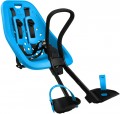— Forward-facing/rear-facing. A seat can be installed in two positions – forward-facing or rear-facing. While the standard choice is forward-facing for most child bike seats, opting for a rear-facing position is beneficial for very young children. This orientation prevents insects and dust from reaching the child's face, allows constant visibility of the parent, and ensures better head support during sudden braking, reducing the risk of injury to the delicate spine compared to forward-facing positions.
—
Harness height adjustment. The ability to change the height of the harnesses, adjusting them to the growth of the baby. A very useful feature in light of the fact that bike seats for kids are often bought for several years, during which the child can grow noticeably.
—
Backrest tilt adjustment. The backrest can be tilted from upright to semi-reclining and backwards. This function is designed mainly for babies who have difficulties with sitting upright for long periods of time and who may fall asleep in the seat during a ride.
—
Footrest adjustment. The ability to change the height of the footrests, adjusting them to the height of the child. This is an indispensable feature if the seat is purchased for several seasons, with the expectation that the child will grow; in fact, most bike seats are purchased with this consideration, which is w
...hy this feature is extremely popular.
— Back ventilation. The presence of holes in the backrest of the seat, providing additional air access to the baby's back. This feature is relevant especially in warm weather: thanks to ventilation, the child's back will sweat less. This not only provides additional comfort, but also reduces the risk of catching a cold.
— Bumper bar. An additional accessory in the form of a rail across the seat at the level of the sitting child's chest and abdomen; it can be either fixed or removable. The baby can comfortably hold on to this bar with his or her hands while riding. In addition, it reduces the likelihood of falling out of the seat during a sudden braking or other unpleasantness: even if the harness fails (for example, due to inattention when fastening), the bumper bar will hold the baby or at least slow down its fall, giving the parent additional time to react.
— Headrest. A device that provides support and additional protection for the child's head. The headrest at least covers the back of the head, and often also from the sides. In some models it is separate, in others the role of the headrest is played by the upper part of the backrest.
